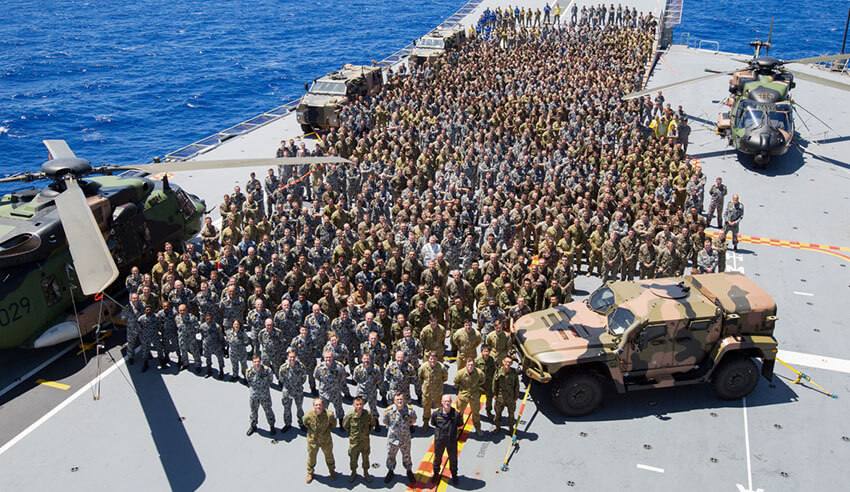The Commonwealth government should ramp up spending to match the growing security threat posed by Beijing, according to ASPI’s executive director.
Earlier this month, the Commonwealth government released its 2021-22 budget, which includes a 4.1 per cent increase in Defence spending to $44.6 billion.
However, the increase was part of a previous commitment from the Commonwealth, and does not reflect overall growth in defence spending.
This is despite the elevated threat environment off the back of a ramp up in aggression from the Chinese Communist Party leadership in Beijing.
“At any time in the last 25 years a defence budget growing at that level would have been welcome. But now Australia and the wider region faces the direst strategic outlook since perhaps the end of World War II,” Peter Jennings, executive director of the Australian Strategic Policy Institute (ASPI), writes.
Jennings points to the potential flashpoint in Taiwan, stating that risk levels would likely peak in four to five years.
“In that period, according to the United States Defense Department, the People’s Liberation Army will gain a strong military edge over the Taiwan Strait in air power, missiles and ships,” he continues.
Jennings warns that President Xi Jinping would use “all means short of war” to advance its Taiwan agenda, testing US and Western resolve.
He goes on to criticise Australian commentators who have downplayed the threat of imminent conflict, pointing to rhetoric from the CCP’s media mouthpiece, the Global Times, which declared that the commissioning of new Chinese warships in April would “play important roles in solving questions in places like the island of Taiwan and the South China Sea”.
Jennings adds: “Hardly a day goes by without PLA aircraft, often in large numbers, encroaching Taiwanese airspace. CCP rhetoric about taking Taiwan by force if necessary is increasingly being used in speeches and editorials.
“Xi will hope this show of strength will deter the US and the allies from stepping in and that his aims can be realised short of war, but we all need to understand that the risk of conflict is sharply growing.”
ASPI’s executive director also alludes to the heightened sense of urgency for stronger defence ties between the US and its allies in the region, noting remarks from a recent meeting between Australia’s Foreign Minister Marise Payne and US Secretary of State Anthony Blinken, who acknowledged that ANZUS needs "to evolve to meet the challenges we face".
Blinken also stressed that the US “will not leave Australia alone on the field” amid economic coercion by China.
But Jennings writes that the US expects Australia to pay a greater role in preserving mutual interests in the region.
Therefore, despite acknowledging that the Morrison government has delivered on its promises to bolster investment in Defence, Jennings argues that Canberra should explore more immediate solutions.
“[The] uncomfortable truth is that the bulk of the $270 billion allocated over the coming decade to build ships, submarines and other military equipment will only come into service well after the riskiest period for Taiwan,” he writes.
“Defence Minister Peter Dutton’s most pressing challenge is to strengthen the Australian Defence Force in the shortest time frame possible.”
Jennings proposes that Defence “move quickly” on the ‘life extension’ and upgrade program for the Collins Class submarine fleet, and should consider increasing the P-8 Poseidon fleet.
Jennings also suggested boosting the US Marines’ presence in the Top End and Western Australia from HMAS Stirling.
“Now, the opportunity to strengthen a shared US and Australian deterrent posture in the Indo-Pacific needs to be urgently reconsidered,” he stresses.
“A conflict over Taiwan would be a disaster for all concerned, but disastrous conflicts happen all the time. At this point the best hope to keep the peace is to change Xi’s calculation about the level of risk China would face if it initiated such a crisis.”
Jennings concludes: “The only short-term way to strengthening deterrence is by lifting the defence readiness of democracies. If US President Joe Biden does visit Australia for the ANZUS anniversary, you can be assured this will be the number one item on his agenda.”
Get involved with the discussion and let us know your thoughts on Australia's future role and position in the Indo-Pacific region and what you would like to see from Australia's political leaders in terms of partisan and bipartisan agenda setting in the comments section below, or get in touch with

 Login
Login







